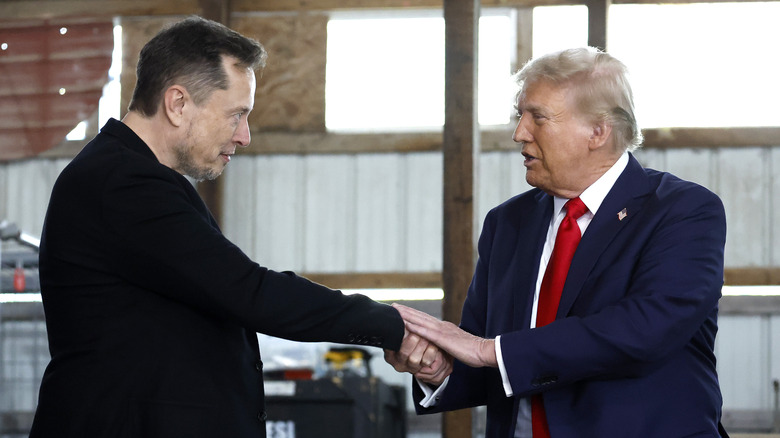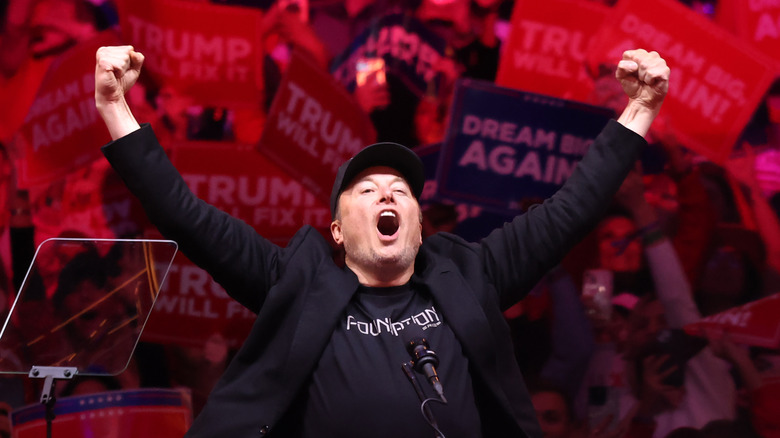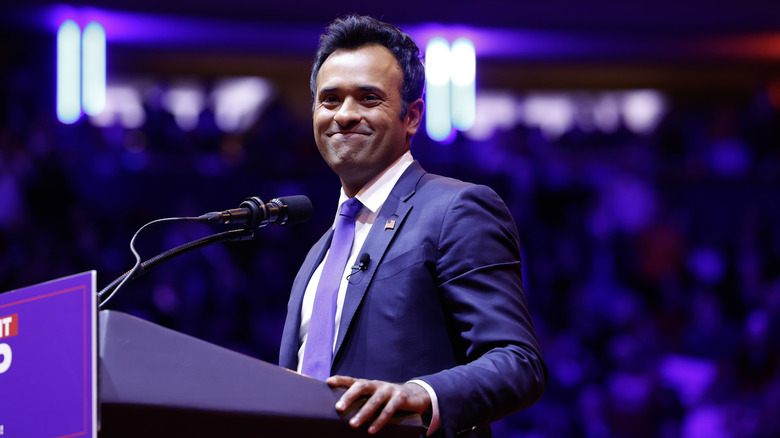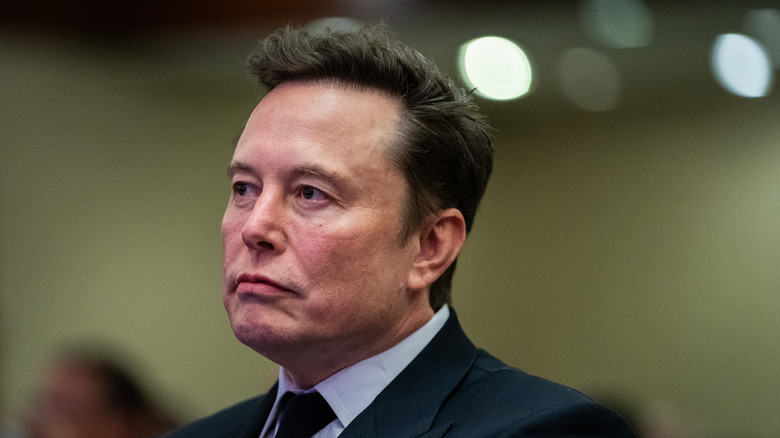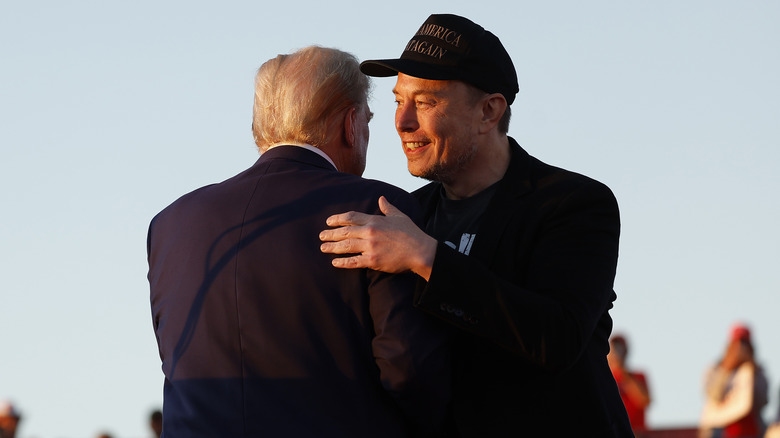Everything You Should Know About Donald Trump's Department Of Government Efficiency
The 2024 presidential election was notable for the emergence of a new major player in American politics, one whose financial muscle and online influence arguably proved to be decisive for the outcome: Elon Musk. The South African-born billionaire has made his name through the ownership of forward-thinking companies such as Tesla and SpaceX. But Musk has become a controversial arbiter of political discourse in recent years, particularly after his headline-making purchase of the social media platform Twitter, which he later rebranded as X. Since then, he has positioned himself as a free speech advocate (despite complying with censorship orders) and openly embraced right-wing positions in his social media posts and public appearances. Shortly after the first assassination attempt against Donald Trump, the tech CEO endorsed the Republican presidential candidate. He then poured $200 million into American PAC, most of it his own money, and the funding body ultimately helped propel Trump to victory.
That Musk threw his entire weight behind Trump's campaign, even making numerous appearances alongside him at rallies across the country, raised the prospect that he was expecting a role in the next administration. And indeed, this has come to pass — the billionaire was announced as being at the head of a new department named the Department of Government Efficiency. The potential impact of the venture is only now coming into view, and there's still a lot we don't know about it.
The name derives from a meme
Donald Trump himself has described the Department of Government Efficiency as "the Manhattan Project of our time," per The Guardian. The comment was a reference to the U.S. government's seismic project with British and Canadian scientists to develop the atomic bomb in the 1940s. But Elon Musk and others have spoken about the new department in surprisingly lighthearted terms. Indeed, the anagram of the name itself, DOGE, is a reference to the popular internet meme of a Japanese shiba inu named Kabosu, of whom Musk is a vocal fan.
The meme first emerged in 2013 and typically featured images of the dog in question overlaid with text written in multicolored comic sans. The prevalence of the concept was so widespread that it influenced the name "Dogecoin," a cryptocurrency that launched in the wake of Bitcoin. Musk has previously been accused of attempting to manipulate the value of the currency through social media posts. He previously claimed that SpaceX would fund a mission to the moon entirely through Dogecoin and that Tesla would accept the cryptocurrency (it did for a time for the sale of merchandise), but neither of these schemes have come to fruition.
What 'government efficiency' might mean in practice
Elon Musk has long joked about a hypothetical Department of Government Efficiency. For many months, it seemed that he was more interested in perpetuating the Doge meme than actually taking a role in the United States government. But on November 13, 2024, Donald Trump made the Department of Government Efficiency a reality and stated that Musk would lead it in a newly formed role.
As Musk's social media posts have made clear, the DOGE will be charged with cutting bureaucracy within the Trump administration, with the intention of stimulating enormous cost-cutting across government departments. Since Trump confirmed Musk's role in the upcoming administration, the Tesla owner has commented on social media posts that criticize executive spending. For example, he spotlighted one on the National Institutes of Health's expenditure on studies into the behavior of hamsters when given steroids, suggesting he would recommend suspending funding for such research. The study, published in Neuroscience, examined the effect of anti-aggression drugs on steroid-induced aggression in hamsters, and such experimentation can determine drug safety in humans.
The DOGE has a mandate to find $2 trillion in savings among the $6.7 trillion federal budget, though critics note that with around two-thirds of that budget reserved for mandatory spending such as Social Security, such a target would be unattainable without seriously destabilizing the lives of many Americans. The department's findings and recommendations are due to be delivered to the Trump administration on July 4, 2026, the 250th anniversary of the founding of the United States.
Trump has revealed another leader on the project
Elon Musk is undoubtedly the most visible figure associated with the newly coined Department of Government Efficiency. However, following Donald Trump's victory and the announcement that DOGE would really be going ahead, he revealed that entrepreneur and former Republican presidential candidate Vivek Ramaswamy would be co-leading the department. Ramaswamy is known for his far-right political views, and especially for his disdain for big government.
As reported by CBS News, Ramaswamy appeared at a post-election event marking the launch of DOGE held at Trumps' Mar-A-Lago resort in Florida. During a speech, he thanked the incoming president "for making sure that Elon Musk and I are in a position to start the mass deportations of millions of unelected federal bureaucrats out of the D.C. bureaucracy." "And I don't know if you've got to know Elon yet, but he doesn't bring a chisel, he brings a chainsaw, and we're going to be taking it to that bureaucracy," he continued. The businessman also said that he looked forward to having "a lot of fun" finding ways to slash away at bureaucracy and federal spending.
Critics have noted that the dual leadership of the DOGE seemingly runs contrary to its very purpose. "The Office of Government Efficiency is off to a great start with split leadership: two people to do the work of one person," veteran Democrat and senator Elizabeth Warren posted on X. "Yeah, this seems REALLY efficient."
They're calling for 'high-IQ small government revolutionaries'
Elon Musk's alliance with fellow billionaire Donald Trump is the biggest news story the SpaceX CEO has been involved in since his protracted and controversial purchase of Twitter (now X) back in 2022. Musk was criticized at the time for overseeing mass layoffs at the company in the name of making savings, which led to technical issues on the platform. As reported by The Guardian, he allegedly sent employees an email inviting them to commit to loyalty to the brand, "hardcore" working conditions, and "long hours at high intensity" — or be let go. Unconfirmed reports suggested that around three quarters of workers chose to leave.
Following the DOGE announcement, Musk has again sought to create a workforce for the department that would go above and beyond what is normally asked of employees, requesting "high-IQ government revolutionaries" to join him in his attack on government bureaucracy (per The Guardian). Typical roles will involve working 80-hour weeks for no pay. "Indeed, this will be tedious work, make lots of enemies & compensation is zero," Musk admitted.
Critics are highlighting a potential conflict of interest
Elon Musk's involvement in the Department of Government Efficiency comes on top of a huge number of businesses and other interests that the billionaire deals with as part of his portfolio. As well as being CEO of Tesla, SpaceX, and owner of X (formerly Twitter), he is the founder of The Boring Company (which specializes in drilling and infrastructure), Neuralink (which is developing computerized implants for use in human bodies), and the artificial intelligence company xAI. His colleague in the DOGE, Vivek Ramaswamy, who is best known for his involvement in the field of biotech, has a similarly sprawling network of business interests.
Many of the companies these men represent benefit from government contracts. It is unsurprising, then, that critics (Musk has many) were quick to sound the alarm on the DOGE. They said those involved in the endeavor are coming perilously close to influencing government spending in a way that will lead to enormous conflicts of interest down the line, allowing them to enrich themselves in the name of cutting regulations and bureaucracy.
It has also been noted that despite being referred to as a "department," the DOGE is more likely to act in an advisory role rather than exert any executive powers. After all, the federal budget must be approved by Congress, and the structure is not in place to give the DOGE power to subvert the will of U.S. lawmakers. With the DOGE still a long way from delivering its findings, both critics and supporters can only watch and wait.
